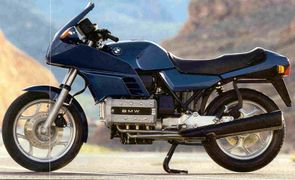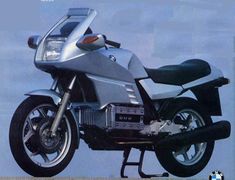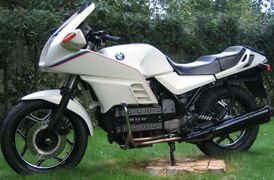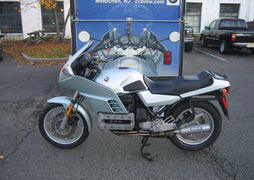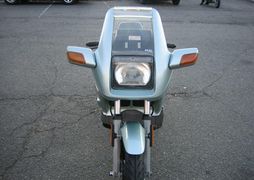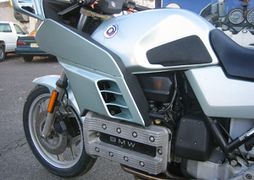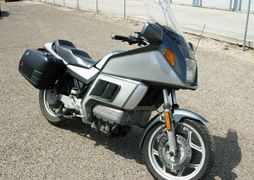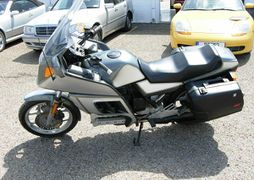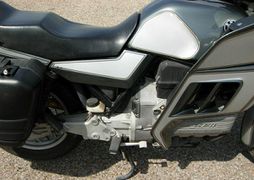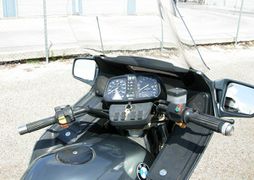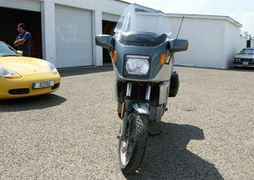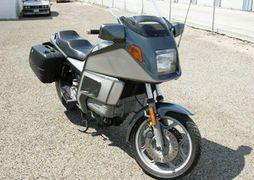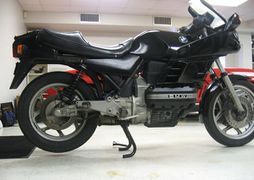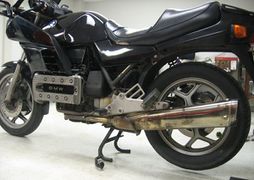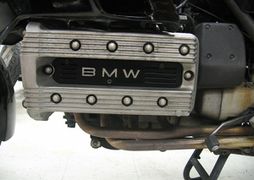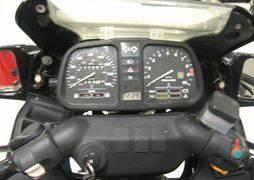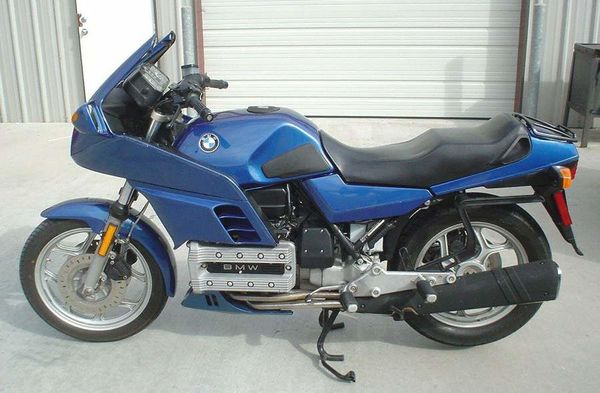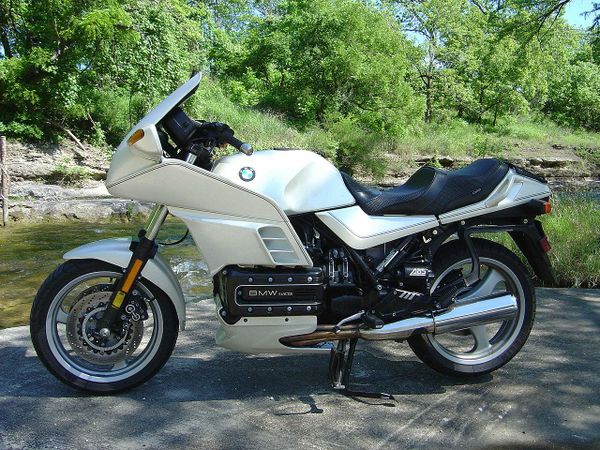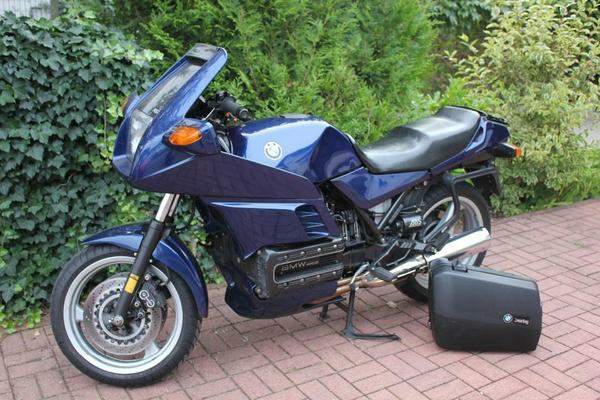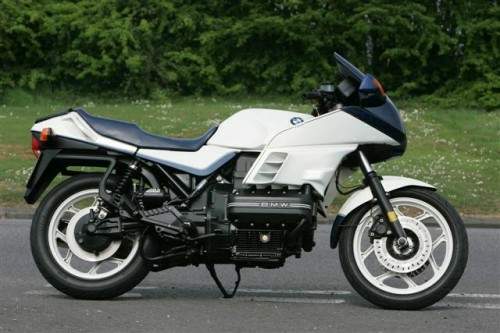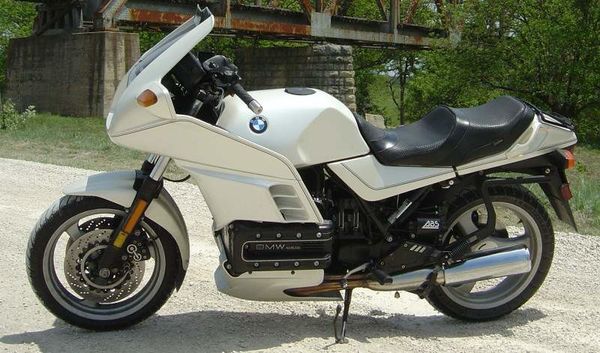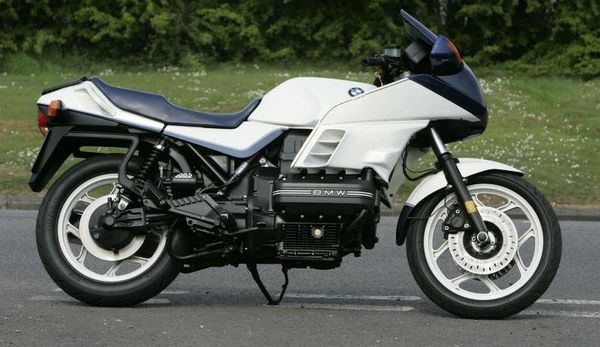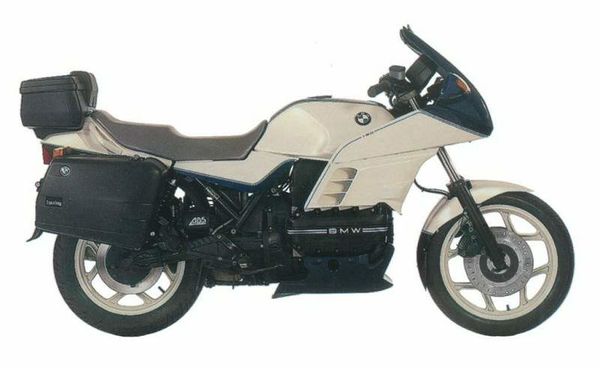BMW K100RS: review, history, specs
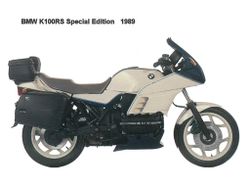 |
|
| BMW K100RS | |
| Manufacturer | |
|---|---|
| Also called | K100RS Motorsport, K 100 RS Motorsport, K100RS ABS, K 100 RS ABS, K 100 RS |
| Production | 1983 - 1992 |
| Class | Sport Touring |
| Engine | in-line four, four-stroke |
| Bore / Stroke | 66.0mm x 66.0mm |
| Compression ratio | 10.2:1 |
| Top Speed | 143 mph (230 km/h) |
| Horsepower | 97.89 HP (73.0 KW) @ 7500RPM |
| Torque | 62.7 ft/lbs (85.0 Nm) @ 6000RPM |
| Spark Plug | NGK D8EA 89-90 |
| Battery | YUASA Y60-N24AL-B |
| Transmission | Gear box: 5-speed Final Drive: shaft drive (cardan) |
| Final Drive | Shaft |
| Suspension | Front: telescopic fork with hydraulic shock absorber Rear: Monolever |
| Brakes | Front: double disc Rear: single 285mm disc, 1-piston caliper |
| Front Tire | 100/90-18 |
| Rear Tire | 130/90-17 |
| Wheelbase | 59.69 inches (1516 mm) |
| Length | 87.4 inches (2220 mm) |
| Width | 37.8 inches (960 mm) |
| Seat Height | 31.89 inches (810 mm) |
| Weight | 263.0 kg (wet) |
| Oil Filter | K&N KN-163[1] |
| Fuel Capacity | 5.81 Gallon (22.00 Liters) |
| Manuals | Service Manual |
|
Reviews · |
|
The BMW K100RS was a in-line four, four-stroke Naked motorcycle produced by BMW between 1983 and 1992. It could reach a top speed of 143 mph (230 km/h). Max torque was 62.7 ft/lbs (85.0 Nm) @ 6000 RPM. Claimed horsepower was 97.89 HP (73.0 KW) @ 7500 RPM.
Engine[edit | edit source]
The engine was a liquid cooled in-line four, four-stroke. A 66.0mm bore x 66.0mm stroke result in a displacement of just 987.0 cubic centimeters. Fuel was supplied via a double overhead cams/twin cam (dohc).
Drive[edit | edit source]
The bike has a 5-speed transmission. Power was moderated via the dry, single plate.
Chassis[edit | edit source]
It came with a 100/90-18 front tire and a 130/90-17 rear tire. Stopping was achieved via double disc in the front and a single 285mm disc, 1-piston caliper in the rear. The front suspension was a telescopic fork with hydraulic shock absorber while the rear was equipped with a Monolever. The K100RS was fitted with a 5.81 Gallon (22.00 Liters) fuel tank. The wheelbase was 59.69 inches (1516 mm) long.
In 1989, BMW launched the K1, a machine shaped in the wind tunnel, with futuristic styling. The K1 was extremely expensive and sold in very small numbers. However, the big bike riders were extremely disappointed that the improvements which had appeared on the K1 were not reflected on other machines in the range.
Flexible and Responsive[edit | edit source]
The K100 RS1 introduced at the beginning of 1990 was the answer. Its distinctive black finished horizontal four-cylinder engine had the 16-valve head first seen on the K1 for extra flexibility and responsiveness. The frame had the same improvements as the K1. The new brakes,with Brembo double piston calipers, delivered maximum efficiency and were backed up by the unmatched safety of the ABS system that BMW had pioneered on motorcycles.
Paralever Suspension[edit | edit source]
The "Paralever" suspension, with its pivoted parallelogram layout, ironed out all the reactions common to shaft-driven motorbikes, from jerky braking to torque reaction under acceleration. While the 1000 RS1 is still expensive, the caliber of the detail work --the superbly designed fairing, the built-in supports for the optional panniers, the control panel as carefully laid out as on a BMW automobile and the high quality tool roll- justifies the price.
1983 BMW K 100 RS[edit | edit source]
The 1983 MY BMW K 100 RS is mainly addressed for riders who expect more performance from their machine. It has, at its heart, a liquid-cooled, four-stroke, fuel-injected, 987cc, in-line four cylinder engine mated to a five-speed manual transmission, and can produce a claimed 90 horsepower and 86 Nm of torque.
It also comes with a half-fairing, a small windscreen, a dual seat, a blacked-out exhaust system, a center stand, an analogue instrument cluster, cast-aluminum wheels, passenger grab handles, a telescopic front fork, a Monolever rear suspension and Brembo brakes with dual front discs and a single disc in the rear.
1984 BMW K 100 RS[edit | edit source]
The 1984 MY BMW K 100 RS sports a liquid-cooled, four-stroke, fuel-injected, 987cc, transverse four cylinder powerhouse paired to a five-speed manual transmission, that can reach a maximum power output of 90 horsepower and 86 Nm of torque.
In addition, it boasts a half-fairing, a small windscreen, a dual seat, a blacked-out exhaust system, a center stand, an analogue instrument cluster, cast-aluminum wheels, passenger grab handles, a telescopic front fork, a Monolever rear suspension and Brembo brakes with dual front discs and a single disc in the rear.
1985 BMW K 100 RS[edit | edit source]
The 1985 MY is a sporty, liter-class machine from the House of Munchen, and comes with a half-fairing, a small windscreen, a dual seat, a blacked-out exhaust system, a center stand, an analogue instrument cluster, cast-aluminum wheels, passenger grab handles, a telescopic front fork, a Monolever rear suspension and Brembo brakes with dual front discs and a single disc in the rear.
In addition, it boasts a maximum power output of 90 horsepower and 86 Nm of torque from its fuel-injected, four-stroke, liquid-cooled, 987cc, transverse four cylinder engine.
1986 BMW K 100 RS[edit | edit source]
The 1986 MY BMW K 100 RS addresses those riders that want enhanced performance, but in a dependable and stable machine. It comes with features such as a half-fairing, a small windscreen, a dual seat, a blacked-out exhaust system, a center stand, an analogue instrument cluster, cast-aluminum wheels, passenger grab handles, a telescopic front fork, a Monolever rear suspension and Brembo brakes with dual front discs and a single disc in the rear.
In the tech/engine department, it sports, a 987cc, fuel-injected, four-stroke, liquid-cooled, transverse four cylinder powerplant mated to a five-speed manual transmission, that can produce a claimed 90 horsepower and 86 Nm of torque.
1987 BMW K 100 RS[edit | edit source]
The 1987 MY BMW K 100 RS has, at its heart, a liquid-cooled, four-stroke, 987cc, transverse four cylinder engine paired to a five-speed manual transmission, and can reach a maximum power output of 90 horsepower and 86 Nm of torque. In addition, it boasts high-end features such as a half-fairing, a small windscreen, a dual seat, a blacked-out exhaust system, a center stand, an analogue instrument cluster, cast-aluminum wheels, passenger grab handles, a telescopic front fork, a Monolever rear suspension and Brembo brakes with dual front discs and a single disc in the rear.
1988 BMW K 100 RS ABS[edit | edit source]
The German engineers from the House of Munich have taken a base K 100 RS and have fitted it with an ABS technology, which greatly improves safety levels, as well as the confidence of the rider. In all other departments, it has the same features as the base model.
In the tech/engine department, it sports a liquid-cooled, four-stroke, 987cc, transverse four cylinder powerplant mated to a five-speed manual transmission, and can produce a claimed 90 horsepower and 86 Nm of torque.
1989 BMW K 100 RS[edit | edit source]
If you liked the K 100 MY from 1983 to 1988, then you might just fall in love with the 1989 MY BMW K 100 RS. The German engineers have improved its engine, adding two more valves per cylinder, which significantly increase the performance of this machine, taking it to 95 horsepower and 86 Nm of torque. In addition, the engine mapping has been modified, to provide a more balanced power output.
In all other departments, the bike has remained relatively unchanged, and still remains one of the most sought after two-wheelers among Beemer fans, and not only.
1990 BMW K 100 RS[edit | edit source]
The 1990 MY BMW K 100 has, at its heart, a fuel-injected, four-stroke, liquid-cooled, 987cc, transverse four cylinder powerplant mated to a five-speed manual transmission, and can reach a maximum power output of 95 horsepower and 86 Nm of torque.
In addition, it comes standard with features such as a 41mm Marzocchi braced telescopic fork, a Monolever suspension in the rear, Brembo brakes with dual discs in the front and a single disc in the rear, a half-fairing, an analogue instrument cluster, cast-aluminum wheels, a dual seat and black engine accents.
1991 BMW K 100 RS[edit | edit source]
The 1991 MY BMW K 100 is a performance-oriented, liter-class machine that comes with features such as a 41mm Marzocchi braced telescopic fork, a Monolever suspension in the rear, Brembo brakes with dual discs in the front and a single disc in the rear, a half-fairing, an analogue instrument cluster, cast-aluminum wheels, a dual seat and black engine accents.
In the tech/engine department, it sports a four-stroke, liquid-cooled, fuel-injected, 987cc, transverse four cylinder powerhouse paired to a five-speed manual transmission, and can produce a claimed 95 horsepower and 86 Nm of torque.
1992 BMW K 100 RS[edit | edit source]
The 1992 MY BMW K 100 is suitable for those riders who want a gritty machine, yet stable and manageable enough to be used in the tough traffic associated with the urban jungle. It has, at its heart, a liquid-cooled, four-stroke, 987cc, in-line four cylinder powerhouse mated to a five-speed manual transmission, that reaches a maximum power output of 95 horsepower and 86 Nm of torque.
In addition, it boasts features such as a 41mm Marzocchi braced telescopic fork, a Monolever suspension in the rear, Brembo brakes with dual discs in the front and a single disc in the rear, a half-fairing, an analogue instrument cluster, cast-aluminum wheels, a dual seat and black engine accents.
In Media[edit | edit source]
- Boon
- Mooi Wark: Warkende Helden
- Airwolf
- Wer
- Fuera de carta
- Les rendez-vous de Paris
- Knight Rider
- Las huellas del lince
- Paniekzaaiers
- Zärtliche Chaoten II
- The Bourne Ultimatum
- Hunter
- Femmes de loi
- In Your Wildest Dreams
References[edit | edit source]
- ↑ 2019 K&L Supply Co Catalog. K&L Supply Co. 2019.
| |||||||||||||||||
